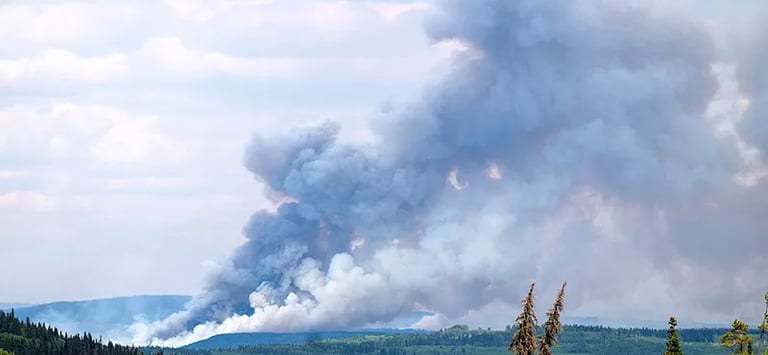GOP Lawmakers Raise Concerns Over Canada’s Wildfire Strategy
GOP lawmakers are questioning Canada’s wildfire response, citing cross-border air quality concerns and environmental management issues. Learn what this means for U.S.-Canada relations and future wildfire prevention.
8/12/20253 min read
If you have been keeping an eye on the news lately, you probably noticed that the conversation around wildfires is heating up again, and not just because of rising temperatures. This time, the debate is drifting across borders. Several Republican lawmakers in the United States are voicing strong concerns about how Canada is handling its wildfire strategy. They argue that the impact is not just a Canadian problem but one that directly affects American air quality, public health, and even the economy.
It is not the first time wildfires in Canada have made headlines in the U.S. Just last year, massive fires in Quebec and British Columbia sent thick smoke drifting south, turning skies in major American cities like New York, Chicago, and Detroit into a hazy orange. The situation got so bad that air quality alerts were issued for millions of Americans. Now, GOP leaders say enough is enough. They believe Canada needs a stronger, more aggressive wildfire prevention plan to protect both countries.
Why the U.S. is Concerned About Canadian Wildfires
Wildfires are no longer a distant, seasonal issue. They have become a year-round threat, intensified by climate patterns and human activities. When Canada experiences large-scale fires, the consequences do not stop at the border. Smoke particles, also known as PM2.5, can travel hundreds of miles. These tiny pollutants can worsen respiratory problems, increase hospital visits, and even affect agricultural production in the Midwest and Northeast.
Republican lawmakers argue that the U.S. should be more proactive in urging Canada to take decisive action. They point out that, while the U.S. invests heavily in wildfire prevention through prescribed burns, rapid response teams, and public education, Canada’s efforts often seem reactive rather than preventive.
The Economic Ripple Effect
One aspect that GOP leaders keep emphasizing is the economic cost. When skies turn smoky, tourism drops, outdoor events get canceled, and businesses suffer. During last year’s wildfire season, major events in states like Minnesota and Michigan were postponed or scaled back due to poor air quality. Airlines had to adjust schedules, and farmers reported reduced sunlight exposure for crops.
There’s also the question of healthcare costs. Respiratory illnesses surged in multiple states when smoke from Canada’s wildfires lingered for days. Hospitals and clinics saw an influx of patients complaining of asthma flare-ups, eye irritation, and other smoke-related issues. The GOP believes that if Canada took a more aggressive stance in managing its forests, these ripple effects could be minimized.
What GOP Lawmakers Want from Canada
The core demand from Republican lawmakers is for Canada to adopt a wildfire strategy that focuses on prevention rather than just response. This includes:
Increasing the number of controlled burns in high-risk areas
Investing in more firefighting equipment and rapid response teams
Collaborating with U.S. experts on best practices
Implementing stricter regulations on logging and land management
Some lawmakers are even suggesting that the U.S. and Canada form a joint task force dedicated to wildfire prevention. This kind of cooperation, they argue, could save billions in long-term damages and healthcare costs.
How Canada Responds to the Criticism
Canadian officials, for their part, acknowledge that wildfires have been more intense in recent years. They attribute much of the problem to climate change, which has created drier conditions and longer fire seasons. They also point out that Canada has vast wilderness areas, making full-scale prevention extremely challenging.
While some Canadian provinces have increased funding for wildfire management, critics say the efforts are still falling short. In response to U.S. concerns, Canada has expressed willingness to share data, coordinate fire suppression efforts along the border, and review forest management practices. However, the scale of change GOP lawmakers are asking for may take years to implement.
The Role of Climate Change in the Debate
No discussion about wildfires would be complete without talking about climate change. Scientists have repeatedly warned that rising global temperatures will continue to increase the risk of severe wildfires. This is due to a combination of factors, including prolonged droughts, changing precipitation patterns, and more frequent heatwaves.
GOP lawmakers tend to focus less on climate change narratives and more on practical land management solutions. They argue that while the climate is certainly a factor, poor forest management is equally to blame. They believe that reducing fuel loads through controlled burns, improving firefighting infrastructure, and enforcing stricter land-use policies could make an immediate difference.
Cross-Border Relations at Stake
The wildfire debate has added another layer to U.S.-Canada relations, which already involve complex discussions on trade, energy, and border security. Air quality concerns have the potential to strain diplomatic ties if both sides cannot find common ground.
Some political analysts say this could even become a talking point in the next U.S. election cycle. Republican candidates may use the issue to highlight the need for stronger environmental cooperation with Canada while criticizing the current administration’s approach to cross-border environmental problems.
What’s Next?
The conversation is far from over. GOP lawmakers are pushing for congressional hearings to address the wildfire issue, inviting experts from both countries to testify. They hope to create a framework that ensures Canadian wildfire smoke does not continue to disrupt American life.
For everyday citizens, the hope is simple: cleaner air, fewer health risks, and less disruption to daily life. Whether this can be achieved through diplomatic pressure or cooperative agreements remains to be seen.


